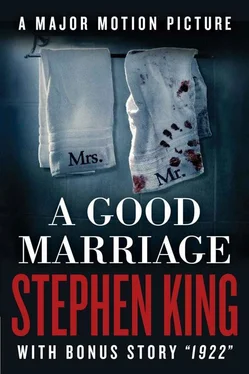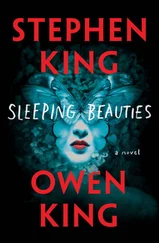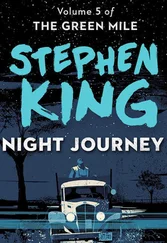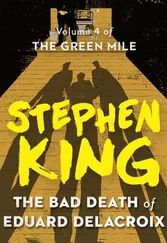* * *
Because they weren’t enough. You see that, don’t you? Of course you do. One doesn’t need to be an expert in triggeronomy to know that one needs to add 35 to 40 to make 75. Doesn’t sound like much, does it? But in those days you could buy two months’ worth of groceries for 35 dollars, or a good used harness at Lars Olsen’s smithy. You could buy a train ticket all the way to Sacramento… which I sometimes wish I had done.
35.
And sometimes when I lie in bed at night, I can actually see that number. It flashes red, like a warning not to cross a road because a train is coming. I tried to cross anyway, and the train ran me down. If each of us has a Conniving Man inside, each of us also has a Lunatic. And on those nights when I can’t sleep because the flashing number won’t let me sleep, my Lunatic says it was a conspiracy: that Cotterie, Stoppenhauser, and the Farrington shyster were all in it together. I know better, of course (at least in daylight). Cotterie and Mr. Attorney Lester might have had a talk with Stoppenhauser later on—after I did what I did—but it was surely innocent to begin with; Stoppenhauser was actually trying to help me out… and do a little business for Home Bank & Trust, of course. But when Harlan or Lester—or both of them together—saw an opportunity, they took it. The Conniving Man out-connived: how do you like that? By then I hardly cared, because by then I had lost my son, but do you know who I really blame?
Arlette.
Yes.
Because it was she who left those two bills inside her red whore’s hat for me to find. And do you see how fiendishly clever she was? Because it wasn’t the 40 that did me in; it was the money between that and what Cotterie demanded for his pregnant daughter’s tutor; what he wanted so she could study Latin and keep up with her triggeronomy .
35, 35, 35.
* * *
I thought about the money he wanted for the tutor all the rest of that week, and over the weekend, too. Sometimes I took out those two bills—I had unfolded them but the creases still remained—and studied at them. On Sunday night I made my decision. I told Henry that he’d have to take the Model T to school on Monday; I had to go to Hemingford Home and see Mr. Stoppenhauser at the bank about a shortie loan. A small one. Just 35 dollars.
“What for?” Henry was sitting at the window and looking moodily out at the darkening West Field.
I told him. I thought it would start another argument about Shannon, and in a way, I wanted that. He’d said nothing about her all week, although I knew Shan was gone. Mert Donovan had told me when he came by for a load of seed corn. “Went off to some fancy school back in Omaha,” he said. “Well, more power to her, that’s what I think. If they’re gonna vote, they better learn. Although,” he added after a moment’s cogitation, “mine does what I tell her. She better, if she knows what’s good for her.”
If I knew she was gone, Henry also knew, and probably before I did—schoolchildren are enthusiastic gossips. But he had said nothing. I suppose I was trying to give him a reason to let out all the hurt and recrimination. It wouldn’t be pleasant, but in the long run it might be beneficial. Neither a sore on the forehead or in the brain behind the forehead should be allowed to fester. If they do, the infection is likely to spread.
But he only grunted at the news, so I decided to poke a little harder.
“You and I are going to split the payback,” I said. “It’s apt to come to no more than 38 dollars if we retire the loan by Christmas. That’s 19 apiece. I’ll take yours out of your choring money.”
Surely, I thought, this would result in a flood of anger… but it brought only another surly little grunt. He didn’t even argue about having to take the Model T to school, although he said the other kids made fun of it, calling it “Hank’s ass-breaker.”
“Son?”
“What.”
“Are you all right?”
He turned to me and smiled—his lips moved around, at least. “I’m fine. Good luck at the bank tomorrow, Poppa. I’m going to bed.”
As he stood up, I said: “Will you give me a little kiss?”
He kissed my cheek. It was the last one.
* * *
He took the T to school and I drove the truck to Hemingford Home, where Mr. Stoppenhauser brought me into his office after a mere five-minute wait. I explained what I needed, but declined to say what I needed it for, only citing personal reasons. I thought for such a piddling amount I would not need to be more specific, and I was right. But when I’d finished, he folded his hands on his desk blotter and gave me a look of almost fatherly sternness. In the corner, the Regulator clock ticked away quiet slices of time. On the street—considerably louder—came the blat of an engine. It stopped, there was silence, and then another engine started up. Was that my son, first arriving in the Model T and then stealing my truck? There’s no way I can know for sure, but I think it was.
“Wilf,” Mr. Stoppenhauser said, “you’ve had a little time to get over your wife leaving the way she did—pardon me for bringing up a painful subject, but it seems pertinent, and besides, a banker’s office is a little like a priest’s confessional—so I’m going to talk to you like a Dutch uncle. Which is only fitting, since that’s where my mother and father came from.”
I had heard this one before—as had, I imagine, most visitors to that office—and I gave it the dutiful smile it was meant to elicit.
“Will Home Bank & Trust loan you 35 dollars? You bet. I’m tempted to put it on a man-to-man basis and do the deal out of my own wallet, except I never carry more than what it takes to pay for my lunch at the Splendid Diner and a shoe-shine at the barber shop. Too much money’s a constant temptation, even for a wily old cuss like me, and besides, business is business. But! ” He raised his finger. “You don’t need 35 dollars.”
“Sad to say, I do.” I wondered if he knew why. He might have; he was indeed a wily old cuss. But so was Harl Cotterie, and Harl was also a shamed old cuss that fall.
“No; you don’t. You need 750, that’s what you need, and you could have it today. Either bank it or walk out with it in your pocket, all the same to me either way. You paid off the mortgage on your place 3 years ago. It’s free and clear. So there’s absolutely no reason why you shouldn’t turn around and take out another mortgage. It’s done all the time, my boy, and by the best people. You’d be surprised at some of the paper we’re carrying. All the best people. Yessir.”
“I thank you very kindly, Mr. Stoppenhauser, but I don’t think so. That mortgage was like a gray cloud over my head the whole time it was in force, and—”
“Wilf, that’s the point !” The finger went up again. This time it wagged back and forth, like the pendulum of the Regulator. “That is exactly the rootin’-tootin’, cowboy-shootin’ point ! It’s the fellows who take out a mortgage and then feel like they’re always walking around in sunshine who end up defaulting and losing their valuable property! Fellows like you, who carry that bank-paper like a barrowload of rocks on a gloomy day, are the fellows who always pay back! And do you want to tell me that there aren’t improvements you could make? A roof to fix? A little more livestock?” He gave me a sly and roguish look. “Maybe even indoor plumbing, like your neighbor down the road? Such things pay for themselves, you know. You could end up with improvements that far outweigh the cost of a mortgage. Value for money, Wilf! Value for money!”
I thought it over. At last I said, “I’m very tempted, sir. I won’t lie about that—”
Читать дальше











